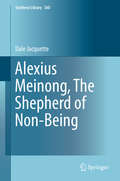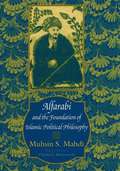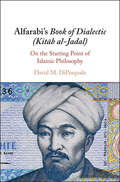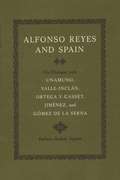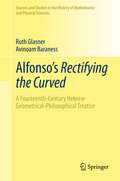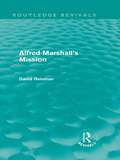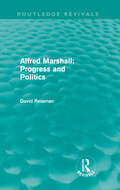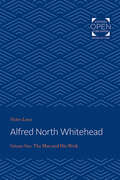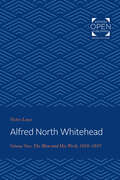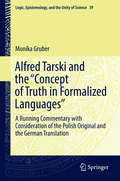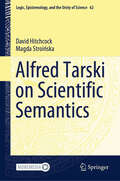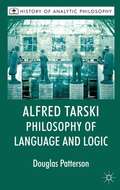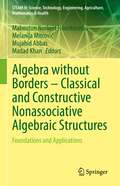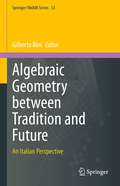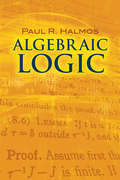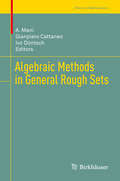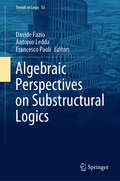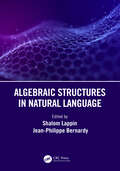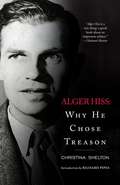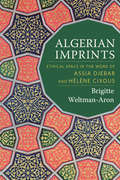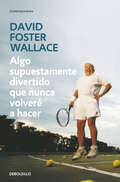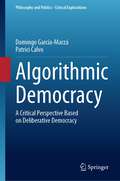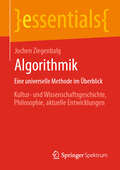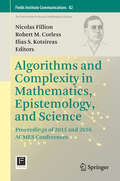- Table View
- List View
Alexius Meinong, The Shepherd of Non-Being (Synthese Library #360)
by Dale JacquetteThis book explores the thought of Alexius Meinong, a philosopher known for his unconventional theory of reference and predication. The chapters cover a natural progression of topics, beginning with the origins of Gegenstandstheorie, Meinong's theory of objects, and his discovery of assumptions as a fourth category of mental states to supplement his teacher Franz Brentano's references to presentations, feelings, and judgments. The chapters explore further the meaning and metaphysics of fictional and other nonexistent intended objects, fine points in Meinongian object theory are considered and new and previously unanticipated problems are addressed. The author traces being and non-being and aspects of beingless objects including objects in fiction, ideal objects in scientific theory, objects ostensibly referred to in false science and false history and intentional imaginative projection of future states of affairs. The chapters focus on an essential choice of conceptual, logical, semantic, ontic and more generally metaphysical problems and an argument is progressively developed from the first to the final chapter, as key ideas are introduced and refined. Meinong studies have come a long way from Bertrand Russell's off-target criticisms and recent times have seen a rise of interest in a Meinongian approach to logic and the theory of meaning. New thinkers see Meinong as a bridge figure between analytic and continental thought, thanks to the need for an adequate semantics of meaning in philosophy of language and philosophy of mind, making this book a particularly timely publication.
Alfarabi and the Foundation of Islamic Political Philosophy
by Muhsin S. MahdiIn this work, Muhsin Mahdi—widely regarded as the preeminent scholar of Islamic political thought—distills more than four decades of research to offer an authoritative analysis of the work of Alfarabi, the founder of Islamic political philosophy. Mahdi, who also brought to light writings of Alfarabi that had long been presumed lost or were not even known, presents this great thinker as his contemporaries would have seen him: as a philosopher who sought to lay the foundations for a new understanding of revealed religion and its relation to the tradition of political philosophy. Beginning with a survey of Islamic philosophy and a discussion of its historical background, Mahdi considers the interrelated spheres of philosophy, political thought, theology, and jurisprudence of the time. He then turns to Alfarabi's concept of "the virtuous city," and concludes with an in-depth analysis of the trilogy, Philosophy of Plato and Aristotle. This philosophical engagement with the writings of and about Alfarabi will be essential reading for anyone interested in medieval political philosophy.
Alfarabi's Book of Dialectic (Kitāb al-Jadal): On the Starting Point of Islamic Philosophy
by David M. DiPasqualeWidely regarded as the founder of the Islamic philosophical tradition, and as the single greatest philosophical authority after Aristotle by his successors in the medieval Islamic, Jewish, and Christian communities, Alfarabi was a leading figure in the fields of Aristotelian logic and Platonic political science. The first complete English translation of his commentary on Aristotle's Topics, Alfarabi's Book of Dialectic, or Kitāb al-Jadal, is presented here in a deeply researched edition based on the most complete Arabic manuscript sources. David M. DiPasquale argues that Alfarabi's understanding of the Socratic art of dialectic is the key prism through which to grasp his recovery of an authentic tradition of Greek science on the verge of extinction. He also suggests that the Book of Dialectic is unique to the extent to which it unites Alfarabi's logical and political writings, opening up novel ways of interpreting Alfarabi's influence.
Alfonso Reyes and Spain
by Barbara Bockus AponteAlfonso Reyes, the great humanist and man of letters of contemporary Spanish America, began his literary career just before the outbreak of the Mexican Revolution of 1910. He spearheaded the radical shift in Mexico's cultural and philosophical orientation as a leading member of the famous "Athenaeum Generation. " The crucial years of his literary formation, however, were those he spent in Spain (1914-1924). He arrived in Madrid unknown and unsure of his future. When he left, he had achieved both professional maturity and wide acclaim as a writer. This book has, as its basis, the remarkable correspondence between Reyes and some of the leading spirits of the Spanish intellectual world, covering not only his years in Spain but also later exchanges of letters. Although Reyes always made it clear that he was a Mexican and a Spanish American, he became a full-fledged member of the closed aristocracy of Spanish literature. It was the most brilliant period in Spain's cultural history since the Golden Age, and it is richly represented here by Reyes' association with five of its most important figures: Miguel de Unamuno and Ramón del Valle-Inclán were of the great "Generation of 98"; among the younger writers were José Ortega y Gasset, essayist and philosopher; the Nobel poet Juan Ramón Jiménez; and Ramón Gómez de la Serna, a precursor of surrealism. Alfonso Reyes maintained lifelong friendships with these men, and their exchanges of letters are of a dual significance. They reveal how the years in Spain allowed Reyes to pursue his vocation independently, thereby prompting him to seek universal values. Coincidentally, they provide a unique glimpse into the inner world of those friends-and their dreams of a new Spain.
Alfonso's Rectifying the Curved: A Fourteenth-Century Hebrew Geometrical-Philosophical Treatise (Sources and Studies in the History of Mathematics and Physical Sciences)
by Ruth Glasner Avinoam BaranessThis volume offers a new English translation, introduction, and detailed commentary on Sefer Meyasher 'Aqov, (The Rectifying of the Curved), a 14th-century Hebrew treatise on the foundation of geometry. The book is a mixture of two genres: philosophical discussion and formal, Euclidean-type geometrical writing. A central issue is the use of motion and superposition in geometry, which is analyzed in depth through dialog with earlier Arab mathematicians. The author, Alfonso, was identified by Gita Gluskina (the editor of the 1983 Russian edition) as Alfonso of Valladolid, the converted Jew Abner of Burgos. Alfonso lived in Castile, rather far from the leading cultural centers of his time, but nonetheless at the crossroad of three cultures. He was raised in the Jewish tradition and like many Sephardic Jewish intellectuals was versed in Greek-Arabic philosophy and science. He also had connections with some Christian nobles and towards the end of his life converted to Christianity. Driven by his ambition to solve the problem of the quadrature of the circle, as well as other open geometrical problems, Alfonso acquired surprisingly wide knowledge and became familiar with several episodes in Greek and Arabic geometry that historians usually consider not to have been known in the West in the fourteenth century. Sefer Meyasher 'Aqov reflects his wide and deep erudition in mathematics and philosophy, and provides new evidence on cultural transmission around the Mediterranean.
Alfred Marshall's Mission (Routledge Revivals)
by David ReismanAlfred Marshall was anxious to do good. Intended by an Evangelical father for the vocation of clergyman, the author of the mould-shaping Principles of Economics remained to the end of his days a great preacher deeply committed to raising the tone of life. First published in 1990, Alfred Marshall’s Mission explains how this most moral of political economists sought to blend the downward sloping utility function of Jevons and Menger with the organic evolutionism of Darwin and Spencer, how this celebrated theorist of social alongside economic growth sought to combine the mathematical marginalism of Cournot. Thunen and Edgeworth with the ethical uplift of Green, Jowett and Toynbee. The conclusion reached is that perhaps Marshall was, after all, too anxious to do good. Far more economists, however, have been not anxious enough; and that in itself gives this study of Marshall’s life and times a present day relevance which would, no doubt, have appealed strongly to the shy Cambridge professor who is its subject.
Alfred Marshall: Progress And Politics (Routledge Revivals)
by David ReismanFirst published in 1987, Alfred Marshall: Progress and Politics provides an enlightening insight into Marshall's thoughts on social improvement, adaptive upgrading, policy and polity. He planned books on these subjects which he never subsequently wrote, but the thesis of this work is that a close study of such writings as Marshall did complete makes possible a very detailed reconstruction of the important contribution which Marshall was capable of making to Victorian evolutionary thought (much in the shadow of Darwin and Spencer). In the ongoing debate on the political element in political economy, he reveals himself to have been as much an eclectic as was Adam Smith and as much a man of commitment as was T. H. Green.
Alfred North Whitehead: The Man and His Work
by Victor LoweOriginally published in 1985. The second volume of Victor Lowe's definitive work on Alfred North Whitehead completes the biography of one of the twentieth century's most influential yet least understood philosophers. In 1910 Whitehead abruptly ended his thirty-year association with Trinity College of Cambridge and moved to London. The intellectual and personal restlessness that precipitated this move ultimately led Whitehead—at the age of sixty-three—to settle in America and change the focus of his work from mathematics to philosophy. Volume 2 of Alfred North Whitehead: The Man and His Work follows Whitehead's journey to the United States and analyzes his expanding intellectual life. Although Whitehead wrote philosophy based on natural science while still in London, he began his most important work shortly after moving to Harvard in 1924. Science and the Modern World appeared in 1925, Religion in the Making in 1926, Symbolism in 1927, and Process and Reality in 1929. Discussing these and other important works, Lowe combines scholarly analysis with valuable insights gathered from Whitehead's friends and colleagues. Although Whitehead ordered that all his private papers be destroyed, Lowe was given access to letters the philosopher wrote to his son, North, and others. Never before published, the letters add a new personal dimension to Whitehead's life and thought. Photographs of the philosopher, his family, and associates provide an intimate look at a private and self-effacing man whose work has had a lasting impact on twentieth-century thought.
Alfred North Whitehead: The Man and His Work: 1910-1947
by Victor LoweOriginally published in 1990. The second volume of Victor Lowe's definitive work on Alfred North Whitehead completes the biography of one of the twentieth century's most influential yet least understood philosophers. In 1910 Whitehead abruptly ended his thirty-year association with Trinity College of Cambridge and moved to London. The intellectual and personal restlessness that precipitated this move ultimately led Whitehead—at the age of sixty-three—to settle in America and change the focus of his work from mathematics to philosophy. Volume 2 of Alfred North Whitehead: The Man and His Work follows Whitehead's journey to the United States and analyzes his expanding intellectual life. Although Whitehead wrote philosophy based on natural science while still in London, he began his most important work shortly after moving to Harvard in 1924. Science and the Modern World appeared in 1925, Religion in the Making in 1926, Symbolism in 1927, and Process and Reality in 1929. Discussing these and other important works, Lowe combines scholarly analysis with valuable insights gathered from Whitehead's friends and colleagues. Although Whitehead ordered that all his private papers be destroyed, Lowe was given access to letters the philosopher wrote to his son, North, and others. Never before published, the letters add a new personal dimension to Whitehead's life and thought. Photographs of the philosopher, his family, and associates provide an intimate look at a private and self-effacing man whose work has had a lasting impact on twentieth-century thought.
Alfred Tarski and the "Concept of Truth in Formalized Languages": A Running Commentary with Consideration of the Polish Original and the German Translation (Logic, Epistemology, and the Unity of Science #39)
by Monika GruberThis book provides adetailed commentary on the classic monograph by Alfred Tarski, and offers areinterpretation and retranslation of the work using the original Polish textand the English and German translations. In the original work, Tarski presentsa method for constructing definitions of truth for classical, quantificationalformal languages. Furthermore, using the defined notion of truth, hedemonstrates that it is possible to provide intuitively adequate definitions ofthe semantic notions of definability and denotation and that the notion in astructure can be defined in a way that is analogous to that used to definetruth. Tarski's piece is considered to be one of the major contributions tologic, semantics, and epistemology in the 20th century. However, the authorpoints out that some mistakes were introduced into the text when it wastranslated into German in 1935. As the 1956 English version of the work wastranslated from the German text, those discrepancies were carried over in additionto new mistakes. The author has painstakingly compared the three texts,sentence-by-sentence, highlighting the inaccurate translations, offeringexplanations as to how they came about, and commenting on how they haveinfluenced the content and suggesting a correct interpretation of certainpassages. Furthermore, the author thoroughly examines Tarski's article,offering interpretations and comments on the work.
Alfred Tarski on Scientific Semantics (Logic, Epistemology, and the Unity of Science #62)
by David Hitchcock Magda StroińskaThis book tells the story of the landmark event in modern logic whereby Alfred Tarski became “the man who defined truth”. Alfred Tarski’s classic monograph on truth became known internationally in 1935, when he presented its ideas in German at an international conference and collaborated in preparation of its German translation. This book provides the first English translation of the Polish version of Tarski’s conference paper, which for purposes of comparison is printed side-by-side with a new exact English translation of the German version. It offers for the first time a comprehensive and detailed analysis of the paper, and for the first time a description and analysis of the discussion of the paper immediately after its presentation. It discusses 22 substantive differences between the two versions. The book also extracts from recently discovered correspondence about the German translation of the truth monograph how it was decided to produce such a translation, the process of vetting and changing the translation, changes requested by Tarski, objections to the appeal to intuition in the Polish original (supported by a list of those appeals with their replacements in the German and English translations), other translational issues, discrepancies other than those concerning appeals to intuition between the Polish original and its German translation, the “Keystone cops” saga of Tarski’s off-prints, and monetary matters. It lists from Tarski’s journal his skiing, mountaineering and tourist trips in 1935, and describes his companions on those trips. An electronic supplement translates or summarizes the complete correspondence, with comments, and includes images from Tarski’s journal of his itineraries of his 1935 trips, with the editors' explanatory comments.
Alfred Tarski: Philosophy of Language and Logic
by Douglas PattersonThis study looks to the work of Tarski's mentors Stanislaw Lesniewski and Tadeusz Kotarbinski, and reconsiders all of the major issues in Tarski scholarship in light of the conception of Intuitionistic Formalism developed: semantics, truth, paradox, logical consequence.
Algebra without Borders – Classical and Constructive Nonassociative Algebraic Structures: Foundations and Applications (STEAM-H: Science, Technology, Engineering, Agriculture, Mathematics & Health)
by Mujahid Abbas Mahouton Norbert Hounkonnou Melanija Mitrović Madad KhanThis book gathers invited, peer-reviewed works presented at the 2021 edition of the Classical and Constructive Nonassociative Algebraic Structures: Foundations and Applications—CaCNAS: FA 2021, virtually held from June 30 to July 2, 2021, in dedication to the memory of Professor Nebojša Stevanović (1962-2009). The papers cover new trends in the field, focusing on the growing development of applications in other disciplines. These aspects interplay in the same cadence, promoting interactions between theory and applications, and between nonassociative algebraic structures and various fields in pure and applied mathematics.In this volume, the reader will find novel studies on topics such as left almost algebras, logical algebras, groupoids and their generalizations, algebraic geometry and its relations with quiver algebras, enumerative combinatorics, representation theory, fuzzy logic and foundation theory, fuzzy algebraic structures, group amalgams, computer-aided development and transformation of the theory of nonassociative algebraic structures, and applications within natural sciences and engineering.Researchers and graduate students in algebraic structures and their applications can hugely benefit from this book, which can also interest any researcher exploring multi-disciplinarity and complexity in the scientific realm.
Algebraic Geometry between Tradition and Future: An Italian Perspective (Springer INdAM Series #53)
by Gilberto BiniAn incredible season for algebraic geometry flourished in Italy between 1860, when Luigi Cremona was assigned the chair of Geometria Superiore in Bologna, and 1959, when Francesco Severi published the last volume of the treatise on algebraic systems over a surface and an algebraic variety. This century-long season has had a prominent influence on the evolution of complex algebraic geometry - both at the national and international levels - and still inspires modern research in the area. "Algebraic geometry in Italy between tradition and future" is a collection of contributions aiming at presenting some of these powerful ideas and their connection to contemporary and, if possible, future developments, such as Cremonian transformations, birational classification of high-dimensional varieties starting from Gino Fano, the life and works of Guido Castelnuovo, Francesco Severi's mathematical library, etc. The presentation is enriched by the viewpoint of various researchers of the history of mathematics, who describe the cultural milieu and tell about the bios of some of the most famous mathematicians of those times.
Algebraic Logic (Dover Books on Mathematics #154)
by Paul R. HalmosBeginning with an introduction to the concepts of algebraic logic, this concise volume features ten articles by a prominent mathematician that originally appeared in journals from 1954 to 1959. Covering monadic and polyadic algebras, these articles are essentially self-contained and accessible to a general mathematical audience, requiring no specialized knowledge of algebra or logic.Part One addresses monadic algebras, with articles on general theory, representation, and freedom. Part Two explores polyadic algebras, progressing from general theory and terms to equality. Part Three offers three items on polyadic Boolean algebras, including a survey of predicates, terms, operations, and equality. The book concludes with an additional bibliography and index.
Algebraic Methods in General Rough Sets (Trends in Mathematics)
by A. Mani Gianpiero Cattaneo Ivo DüntschThis unique collection of research papers offers a comprehensive and up-to-date guide to algebraic approaches to rough sets and reasoning with vagueness. It bridges important gaps, outlines intriguing future research directions, and connects algebraic approaches to rough sets with those for other forms of approximate reasoning. In addition, the book reworks algebraic approaches to axiomatic granularity. Given its scope, the book offers a valuable resource for researchers and teachers in the areas of rough sets and algebras of rough sets, algebraic logic, non classical logic, fuzzy sets, possibility theory, formal concept analysis, computational learning theory, category theory, and other formal approaches to vagueness and approximate reasoning. Consultants in AI and allied fields will also find the book to be of great practical value.
Algebraic Perspectives on Substructural Logics (Trends in Logic #55)
by Francesco Paoli Davide Fazio Antonio LeddaThis volume presents the state of the art in the algebraic investigation into substructural logics. It features papers from the workshop AsubL (Algebra & Substructural Logics - Take 6). Held at the University of Cagliari, Italy, this event is part of the framework of the Horizon 2020 Project SYSMICS: SYntax meets Semantics: Methods, Interactions, and Connections in Substructural logics. Substructural logics are usually formulated as Gentzen systems that lack one or more structural rules. They have been intensively studied over the past two decades by logicians of various persuasions. These researchers include mathematicians, philosophers, linguists, and computer scientists. Substructural logics are applicable to the mathematical investigation of such processes as resource-conscious reasoning, approximate reasoning, type-theoretical grammar, and other focal notions in computer science. They also apply to epistemology, economics, and linguistics. The recourse to algebraic methods -- or, better, the fecund interplay of algebra and proof theory -- has proved useful in providing a unifying framework for these investigations. The AsubL series of conferences, in particular, has played an important role in these developments. This collection will appeal to students and researchers with an interest in substructural logics, abstract algebraic logic, residuated lattices, proof theory, universal algebra, and logical semantics.
Algebraic Structures in Natural Language
by Jean-Philippe BernardyAlgebraic Structures in Natural Language addresses a central problem in cognitive science concerning the learning procedures through which humans acquire and represent natural language. Until recently algebraic systems have dominated the study of natural language in formal and computational linguistics, AI, and the psychology of language, with linguistic knowledge seen as encoded in formal grammars, model theories, proof theories and other rule-driven devices. Recent work on deep learning has produced an increasingly powerful set of general learning mechanisms which do not apply rule-based algebraic models of representation. The success of deep learning in NLP has led some researchers to question the role of algebraic models in the study of human language acquisition and linguistic representation. Psychologists and cognitive scientists have also been exploring explanations of language evolution and language acquisition that rely on probabilistic methods, social interaction and information theory, rather than on formal models of grammar induction. This book addresses the learning procedures through which humans acquire natural language, and the way in which they represent its properties. It brings together leading researchers from computational linguistics, psychology, behavioral science and mathematical linguistics to consider the significance of non-algebraic methods for the study of natural language. The text represents a wide spectrum of views, from the claim that algebraic systems are largely irrelevant to the contrary position that non-algebraic learning methods are engineering devices for efficiently identifying the patterns that underlying grammars and semantic models generate for natural language input. There are interesting and important perspectives that fall at intermediate points between these opposing approaches, and they may combine elements of both. It will appeal to researchers and advanced students in each of these fields, as well as to anyone who wants to learn more about the relationship between computational models and natural language.
Alger Hiss: Why He Chose Treason
by Christina SheltonIn 1948, former U.S. State Department official Alger Hiss was accused of being a Soviet spy. Because the statute of limitations on espionage had run out, he was convicted only of perjury. Decades later--after the Hiss trial had been long forgotten by most--archival evidence surfaced confirming the accusations: a public servant with access to classified documents had indeed passed crucial information to the Soviets for more than a decade. Yet many on the American Left still consider Hiss an iconic figure--an innocent victim accused of unsubstantiated crimes. They prefer to focus on the collectivist ideals Hiss stood for, rather than confront the reality of a man who systematically and methodically betrayed his country. Former U.S. Intelligence analyst Christina Shelton employs an in-depth knowledge of Soviet intelligence affairs as well as recently released Hungarian and KGB archival material to shine a fresh light on one of the most famous espionage cases. The story is dramatic, but Shelton's analysis goes beyond sensationalism as she explores both the ideological motivation behind Hiss's behavior and the lasting influence it has had on U.S. foreign policy. Why exactly were the intellectual elite so deter-mined that Hiss was innocent? His accuser, Time magazine senior editor Whittaker Chambers--originally Hiss's Soviet handler--presented compelling written evidence. However, the intelligentsia were intent on supporting one of their own. They ignored the facts, a willful blindness that helped contribute to a polarization still in place in our country today. Thirty years of intelligence analysis gives Shelton the expertise to approach the story from many different angles, especially: * Her persuasive argument that Communism and Fascism are not polar opposites, as has so long been claimed, but highly similar ideologies. * How Hiss's central role at the Yalta Conference and the founding of the United Nations are examples of the significance of Soviet intelligence recruitment of high-level Americans who could influence U.S. foreign policy in their favor. * Why the silence surrounding the implications of Hiss's espionage continues--and why apologists fear that smearing his name would undercut New Deal policies and the United Nations. Shelton doesn't just detail the body of evidence pointing to Hiss's guilt; she suggests new layers of meaning in light of the current political landscape. Today, the importance of understanding Hiss's ideological commitment has never been more vital. His advocacy of collectivism and internationalism still resonate among the political elite, making this book an important and timely analysis of American thought at this critical juncture in our country's life.
Algerian Imprints: Ethical Space in the Work of Assia Djebar and Hélène Cixous
by Brigitte Weltman-AronBorn and raised in French Algeria, Assia Djebar and Hélène Cixous represent in their literary works signs of conflict and enmity, drawing on discordant histories so as to reappraise the political on the very basis of dissensus.In a rare comparison of these authors' writings, Algerian Imprints shows how Cixous and Djebar consistently reclaim for ethical and political purposes the demarcations and dislocations emphasized in their fictions. <P><P>Their works affirm the chance for thinking afforded by marginalization and exclusion and delineate political ways of preserving a space for difference informed by expropriation and nonbelonging. Cixous's inquiry is steeped in her formative encounter with the grudging integration of the Jews in French Algeria, while Djebar's narratives concern the colonial separation of "French" and "Arab," self and other. Yet both authors elaborate strategies to address inequality and injustice without resorting to tropes of victimization, challenging and transforming the understanding of the history and legacy of colonized space.
Algo supuestamente divertido que nunca volveré a hacer
by David Foster WallaceEste artículo es una de las radiografías más agudas e irreverentes de la cultura americana de fin de siglo, en la que se entremezclan la familiaridad, el asombro y una mordacidad descabellada. Foster Wallace elabora en Algo supuestamente divertido que nunca volveré a hacer una postal gigantesca basada en su experiencia en un crucero de lujo por el Caribe. Lo que a primera vista parece ser un simple viaje «para relajarse», en manos de un humor delirante y un cinismo corrosivo acabará convirtiéndose en el horror más absoluto. La crítica ha dicho...«La obra de no ficción más brillante y divertida que se ha escrito en los últimos años.»John Glassie, Time Out New York «Animado por una prosa maravillosamente exuberante [...] este volumen confirma al señor Wallace como uno de los talentos más destacados de su generación.»The New York Times «Wallace escribe con una intensidad que transforma un reportaje errático en una forma sui generis de filosofía.»Kirkus Reviews «Su instinto para reproducir lo coloquial avergonzaría a maestros como Pynchon y DeLillo, y la sobriedad humana que confiere a sus temas, de ficción o de no ficción, deberían ser un modelo para cualquiera que escriba crítica cultural, tanto en la forma de relatos como en ensayos como estos.»Publishers Weekly
Algorithmic Democracy: A Critical Perspective Based on Deliberative Democracy (Philosophy and Politics - Critical Explorations #29)
by Domingo García-Marzá Patrici CalvoBased on a deliberative democracy, this book uses a hermeneutic-critical methodology to study bibliographical sources and practical issues in order to analyse the possibilities, limits and consequences of the digital transformation of democracy. Drawing on a two-way democracy, the aim of this book is intended as an aid for thinking through viable alternatives to the current state of democracy with regard to its ethical foundations and the moral knowledge implicit in or assumed by the way we perceive and understand democracy. It is intended to stimulate reflection and discussion on the basis that, by addressing what we understand as democracy, we can inevitably influence the reality known as democracy. Democracy’s evident regression in today’s world makes this all too apparent: it has become a hostage to all kinds of autocracies and technopopulisms, which are supported to a greater or lesser extent by the current algorithmic revolution.
Algorithmik Eine universelle Methode im Überblick: Kultur- und Wissenschaftsgeschichte, Philosophie, aktuelle Entwicklungen (essentials)
by Jochen ZiegenbalgDieses essential zeigt aus einer allgemeinbildenden und allgemeinverständlichen Perspektive, wie universell und bedeutend die algorithmische Methode ist. Es beleuchtet dabei sowohl die historischen Anfänge des algorithmischen Denkens und seine philosophischen Hintergründe als auch seine Relevanz für aktuelle Anwendungen – etwa im Bereich der Programmierung bis hin zu künstlicher Intelligenz. Die kompakte, in sich geschlossene Darstellung ist dabei weitestgehend anschaulicher Natur – ganz im Sinne der Methodologie des algorithmischen Arbeitens, die von Konstruktivität, Elementarität und explorativem Problemlösen geprägt ist. Auf technische Formulierungen wird in diesem essential so weit wie möglich verzichtet.
Algorithms and Complexity in Mathematics, Epistemology, and Science: Proceedings of 2015 and 2016 ACMES Conferences (Fields Institute Communications #82)
by Ilias S. Kotsireas Robert M. Corless Nicolas FillionACMES (Algorithms and Complexity in Mathematics, Epistemology, and Science) is a multidisciplinary conference series that focuses on epistemological and mathematical issues relating to computation in modern science. This volume includes a selection of papers presented at the 2015 and 2016 conferences held at Western University that provide an interdisciplinary outlook on modern applied mathematics that draws from theory and practice, and situates it in proper context. These papers come from leading mathematicians, computational scientists, and philosophers of science, and cover a broad collection of mathematical and philosophical topics, including numerical analysis and its underlying philosophy, computer algebra, reliability and uncertainty quantification, computation and complexity theory, combinatorics, error analysis, perturbation theory, experimental mathematics, scientific epistemology, and foundations of mathematics. By bringing together contributions from researchers who approach the mathematical sciences from different perspectives, the volume will further readers' understanding of the multifaceted role of mathematics in modern science, informed by the state of the art in mathematics, scientific computing, and current modeling techniques.
Algorithms of Education: How Datafication and Artificial Intelligence Shape Policy
by Kalervo N. Gulson P. Taylor Webb Sam SellarA critique of what lies behind the use of data in contemporary education policy While the science fiction tales of artificial intelligence eclipsing humanity are still very much fantasies, in Algorithms of Education the authors tell real stories of how algorithms and machines are transforming education governance, providing a fascinating discussion and critique of data and its role in education policy.Algorithms of Education explores how, for policy makers, today&’s ever-growing amount of data creates the illusion of greater control over the educational futures of students and the work of school leaders and teachers. In fact, the increased datafication of education, the authors argue, offers less and less control, as algorithms and artificial intelligence further abstract the educational experience and distance policy makers from teaching and learning. Focusing on the changing conditions for education policy and governance, Algorithms of Education proposes that schools and governments are increasingly turning to &“synthetic governance&”—a governance where what is human and machine becomes less clear—as a strategy for optimizing education.Exploring case studies of data infrastructures, facial recognition, and the growing use of data science in education, Algorithms of Education draws on a wide variety of fields—from critical theory and media studies to science and technology studies and education policy studies—mapping the political and methodological directions for engaging with datafication and artificial intelligence in education governance. According to the authors, we must go beyond the debates that separate humans and machines in order to develop new strategies for, and a new politics of, education.
